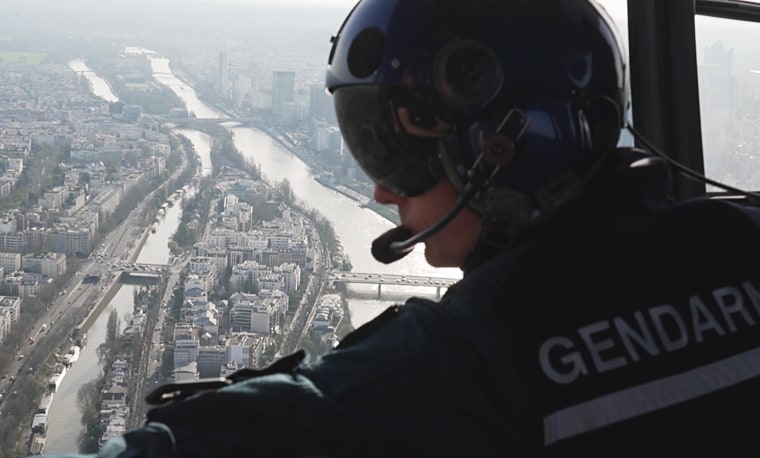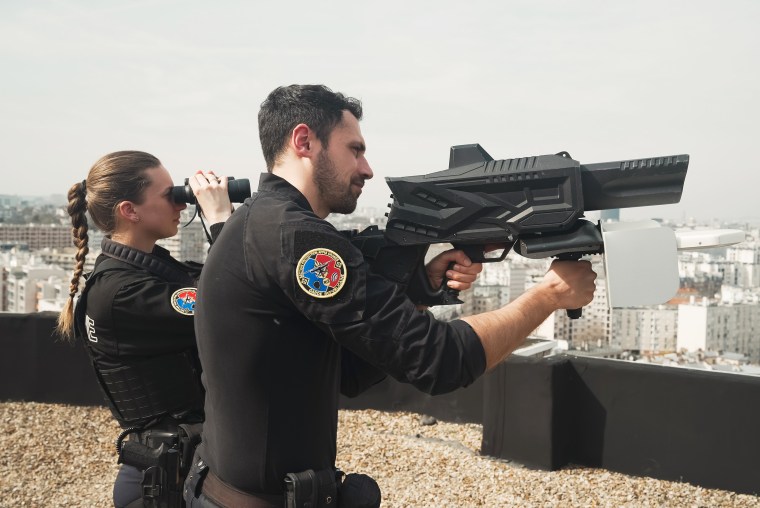Aboard the eyes in the sky charged with keeping Paris Olympics secure
PARIS — They have the best seats in the house for this summer’s Paris Olympics, but they won’t be enjoying the sports.
Maj. John and Col. Dry will be the eyes in the sky for one of the most challenging and stringent security operations ever deployed at the Games.
NBC News got an exclusive invite last week to board their military police helicopter as they swooped over the sprawling Chateau de Versailles, the former royal residence now hosting equestrian events, to La Defense business district where seating for swimming competitions is under construction. Then along the river Seine, the scene of the opening ceremony, to the Olympic stadium, the Stade de France, and the multicolored townhouses of the suburban Olympic Village.
It’s no sightseeing tour: The Gendarmerie, as these military cops are known, will use pioneering surveillance tech to spot threats from the air and, if necessary, deploy SWAT teams should the City of Lights suffer a terrorist attack during the Olympics that kick off July 26.

“We will be watching, but you won’t see us and you won’t hear us,” said Dry, 49, who, like his gendarme colleague, was not permitted to give his first name. “Our special cameras and electronics mean we can observe from up to 4 or 5 kilometers (around 2.5 to 3 miles) away.”
In a crisis they can reach any part of Paris in five minutes, they said.
“We will be there every hour of the day, every day every night,” said co-pilot John, 40.
France is deploying 45,000 police, military police and army troops across the country. And everyone involved in the Games will be subject to background checks — 1 million checks on everyone from security and building workers to event volunteers — according to a Ministry of Interior news briefing earlier this month, which said some 100,000 checks had so far yielded 280 “red flags” that needed further investigation.
(NBC News’ parent company, the Comcast-owned NBCUniversal, is the world’s largest Olympics broadcaster and the largest source of income for the International Olympic Committee.)
Security is always a big issue at the Games, an event with memories of 1972’s Munich massacre and the Centennial Olympic Park bombing at Atlanta 1996.
But what makes Paris unique — and particularly difficult from a security perspective — is its ambitious opening ceremony: a 10,500-athlete, 90-boat flotilla down the Seine. The first time the event will be held outside of a stadium, the picturesque Parisian backdrop will bring all sorts of riddles over how to police the 3.5-mile route’s countless rooftops and residential balconies.

“There’s always this push in the Olympics to do something novel and unique with the opening ceremony, and what they’ve come up with sounds fantastic,” said Tim Bradley, a former FBI special agent who organized security for events ranging from the Super Bowl to former President Bill Clinton’s 1997 inauguration.
“But from a security perspective” it’s “going to be a huge, huge undertaking,” he said, and even then “I think you’re kind of going to be holding your breath a little bit.”
NBC News spent time last week with an anti-drone unit, whose operators send out their own drones to search for unmanned aerial offenders, before jamming their signals and, hopefully, catching the pilot.
The Olympics come during a time of acute anxiety. President Emmanuel Macron’s government raised its security alert to the highest level after he said this week that ISIS-K, the terror group affiliate that killed 140 people at a Moscow concert hall, had tried to carry out attacks on French soil.
“If they can do it in Moscow, they can presumably try and do it in other capitals,” said François Heisbourg, one of France’s top terrorism experts who has advised successive prime ministers. “ISIS is an equal opportunity terror group.”

For Paris, the massacre carried painful echoes of November 2015, when militants attacked multiple sites and killed 139 people, most of them at the Bataclan concert hall. France has suffered sporadic attacks in the years since.
“When we decided to bid for 2024, it was just after the attacks,” Paris 2024 president Tony Estanguet told NBC News in an interview last week. “I think it was important for our country also to demonstrate that we are not afraid.”
“We will continue to live,” Estanguet added. “We will continue to…
Read More: Aboard the eyes in the sky charged with keeping Paris Olympics secure

